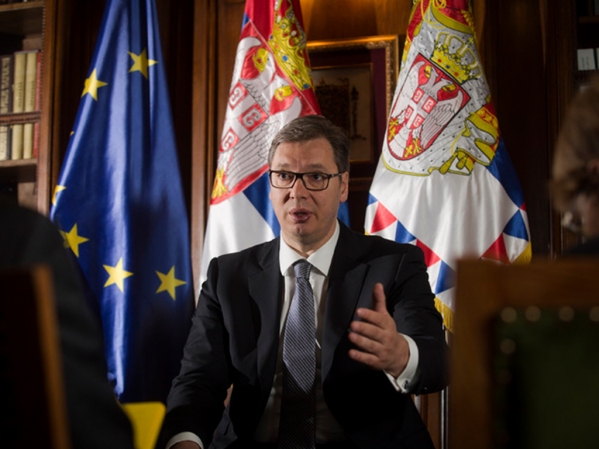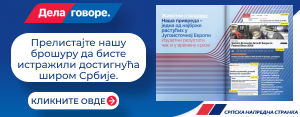
Serb President Delays Kosovo Deal to Give It a Better Shot
Serbian President Aleksandar Vucic said a deal with Kosovo, the biggest hurdle to his country joining the European Union, isn’t imminent as both sides remain far apart, forcing him to delay his goal to unveil the proposal within weeks.
Vucic said more time was needed to get world powers, including the EU and the U.S. to pressure Kosovo into agreeing to concessions, so he can present the deal to his Balkan nation of 7 million people without feeling “humiliated.”
The president last year started an “internal dialog” over Kosovo, whose 2008 split from Serbia followed the NATO bombing campaign that forced out late Serb President Slobodan Milosevic’s forces in 1999. The deal is crucial for the stability for the western Balkans, repeatedly torn apart by bloody wars.
“It’s better to wait,” Vucic said Wednesday in an interview in the Presidential Palace in Belgrade, the capital. “No more deadlines. But I thought we were closer” to a solution “than we are.”
In Serbia, where the 48-year-old president’s party controls nearly two-thirds of parliament, most citizens would prefer a frozen conflict to a resolution, a situation that would pose a threat that the region can’t afford, he said.
Political Mistakes
“If you have a frozen conflict, someone will defreeze it,” Vucic said. “And that will be the end of normal life for the entire region.”
Democratic and living standards in the former Yugoslavia’s largest state deteriorated in the bloody Balkan wars of the 1990s that saw tens of thousands of people killed, tortured and raped.
“We need to realize when you make terrible political mistakes that you need to pay the price,” he said. “But at the same time, all the others need to learn that you can’t humiliate one nation.”
Vucic has morphed from a nationalist politician in the 1990s, when he served as information minister to Milosevic during the war with Kosovo, to one pledging to lead Serbia into the EU and at the same time keeping close ties with its ally Russia. He became the prime minister in 2014 and won presidential elections last year.
Once in the EU, Vucic hopes Serbia will be helped economically as it still struggles with 13 percent unemployment and living standards below those of Bulgaria, the bloc’s poorest member. Membership, penciled in for around 2025, will halt also Serbia’s brain drain, he said.
European Council President Donald Tusk said in Tirana, Albania yesterday that the road to the EU will be tough and will resemble “more a hurdles race than a motorway.” Tusk is meeting with Vucic in Belgrade on Wednesday.
A decade after the population of overwhelmingly ethnic Albanians declared its independence from Serbia, Kosovo is still seeking to be recognized and hopes to join the EU in the next decade, President Hashim Thaci said on Wednesday, according to GazetaExpress. Serbia’s refusal to recognize Kosovo is backed Russia, China and others.
A Serb official was detained and expelled from Kosovo in March after he ignored warnings not to hold meetings with fellow Serbs in a divided town. Any resolution will require backing from a referendum because it would change the constitution, which still calls Kosovo an integral part of Serbia, according to Vucic.
“If we see that this is by far the best solution for the Serbia’s future, and if Serbia isn’t humiliated, and if Serbs get all the guarantees for their better life, I will fight for that,” he said. “No doubt about it.”
Serb President Wants Central Bank Chief to Stay Another Term
Serbian President Aleksandar Vucic said for the first time that he wants central bank Governor Jorgovanka Tabakovic to stay on for another term in office after her mandate ends in August.
Tabakovic, a senior member of Vucic’s Progressive Party who took over the central bank in 2012, has delivered results, Vucic said, adding that he wants her to remain at the helm of the National Bank of Serbia.
“I didn’t even think about any changes,” Vucic said Wednesday in an interview in the Presidential Palace in Belgrade, the capital. “Things are better than ever. We have a very strong dinar, we’re working together on macroeconomic stabilization, fiscal consolidation and we delivered very, very good results. If she wants to stay, she will stay.”
During Tabakovic’s term, the central bank tightened control over the dinar to reduce daily fluctuations against the euro. Monetary-policy makers lowered the benchmark interest rate to a record 3 percent in April from 11.75 percent in 2013, helping to bolster growth through cheaper lending.
“As long as I have the support of Aleksandar Vucic to continue what we’ve started, I have the will to maintain the established financial stability,” Tabakovic said in an emailed response when asked to comment on a possible second term. “We’ve given a new meaning to the coordination of monetary and fiscal policy.”
Despite media reporting that changes in government personnel are on the way sometime in the next two months, Vucic said a reshuffle of Prime Minister Ana Brnabic’s cabinet isn’t imminent. Asked if he’d be willing to let Finance Minister Dusan Vujovic leave, following newspaper reports that his place may be vacated in the shakeup, Vucic said “it’s not about letting anyone go,” and that people who want to are free to step down.
“We’ll speak about that when we have something on Kosovo,” Vucic said, referring to talks to settle the dispute between the two sides. “It doesn’t matter if it’s going to be in 15 days or a month or two months. There’s a need to speak about an entire package. But whoever wants to resign, whoever wants to leave the government, it’s their right to do so. ”
source: bloombergquint.com

